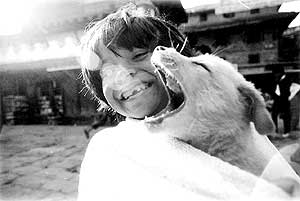 It was to be a great day in the life of an unaffiliated aid worker in Nepal, and today's mission was to help a dozen puppies noticed yesterday piled in the mound in the lot behind my office. A dozen puppies huddled together for warmth, while 3 or more mothers with udders watched from afar or wandered out in busy Pulchok in search of scraps, invariably being kicked or beaten away from the open-air tea shops or chicken stands. I was ready, and armed with the following: two cans of dog food purchased from a neighbourhood foo-foo grocery store at Rs100 each, a cheap metal spoon also purchased there for Rs35, and one pair of rubber gloves. I came prepared to help the down-trodden, sheathed in rubber, and with a silver spoon other than my own.
It was to be a great day in the life of an unaffiliated aid worker in Nepal, and today's mission was to help a dozen puppies noticed yesterday piled in the mound in the lot behind my office. A dozen puppies huddled together for warmth, while 3 or more mothers with udders watched from afar or wandered out in busy Pulchok in search of scraps, invariably being kicked or beaten away from the open-air tea shops or chicken stands. I was ready, and armed with the following: two cans of dog food purchased from a neighbourhood foo-foo grocery store at Rs100 each, a cheap metal spoon also purchased there for Rs35, and one pair of rubber gloves. I came prepared to help the down-trodden, sheathed in rubber, and with a silver spoon other than my own. I find 12 street urchins playing next to a pile of 12 one-month old puppies of various colors and conditions of health. All of which were very excited to see me-a white boy on a motorcycle, looking vaguely like the Marlboro Man. Their excitement increased as I started opening a can and produced a spoon. Disappointment quickly ripped through the crowd once they realised the food was not for them, but for the dogs. Still, one small boy was deeply honored when I handed him the task of feeding the puppies and the mothers who were starting to growl at my closeness to their pups.
The young lad clearly had to resist the urge to sample the can himself. I then donned my rubber gloves and began picking up the pups and placing them in my specially equipped side boxes, ready to be whisked away to the SPCA Animal Shelter of Nepal where a doctor was waiting, but I was suddenly and surprisingly stopped by a few elderly residents of the neighbourhood.
"What are you doing with those puppies," asked a woman in guttural Nepali.
Luckily, I had brought my friend Prakash from the nearby tea-shop for translation support. I instructed Prakash to tell the rather large and well-dressed woman of our plan: to bring the dogs to the shelter, get them medical treatment, and then to find good homes for them where they would live happily ever after. Well, she was nearly-violently opposed to the idea, as she waved her hands telling us that while we could bring a vet to the dogs, the dogs were not going to a vet.
I had assumed the dogs were stray. After all, I had seen one of the puppies just yesterday running in the traffic. She gestured to her house, "The puppies belong to us." Feeling confused and well aware of the Nepali neighborhood-care system of stray animals I asked her: "But who exactly is taking care of them, who is feeding them, who is keeping them warm?"
She replied with a shrug and a gesture that indicated that she would share no more information with this kuire. But I had one more question for her: "And just who is looking after the puppies like that one." I pointed to the rotting corpse of one who had not-so recently departed the litter. With that she stomped off.
And so did I, puppy-less. I wondered just what I was doing in this country as an unaffiliated aid worker trying to save starving puppies. Once home, for the rest of the afternoon I sat contemplating Buddha's teachings on Idiot Compassion-with an emphasis on the idiot part.
Jigme Gaton is the pen-name of a rarely-employed American "aid" worker in Nepal. Despite his abortive rescue attempt, the Society of the Prevention to Cruelty-Nepal, SPCAN is making a difference to help people and animals who suffer needlessly everyday. [email protected]


